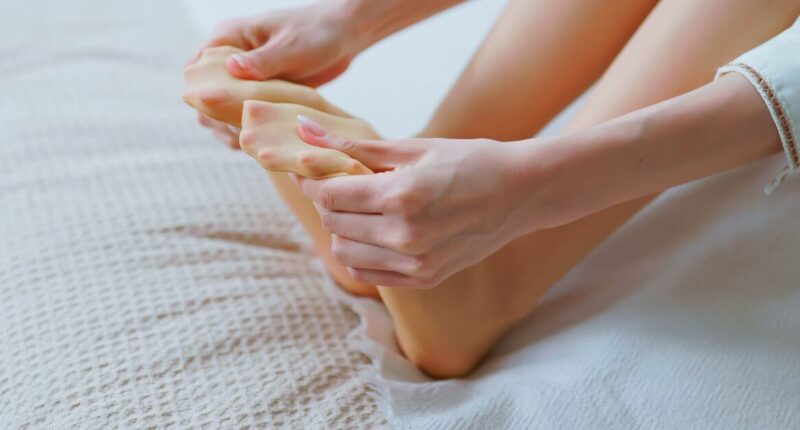Share this @internewscast.com

There’s a trick to nodding off during chillier nights (Image: Getty)
Autumn has arrived, and following the energy price cap’s rise of more than 2% on October 1, most households are delaying turning on their heating for as long as they can manage.
With the arrival of autumn and the recent 2% increase in the energy price cap on October 1, many households are postponing the use of their heating systems for as long as possible. The cooler temperatures bring a unique set of challenges, particularly when it comes to getting a good night’s sleep.
As the nights become chillier, many find themselves struggling to stay warm enough to fall asleep, only to overheat later in the night when they’ve piled on too many blankets. This seasonal transition can significantly disrupt sleep patterns, leaving many tossing and turning.
What makes autumn so disruptive to sleep patterns?
To understand why autumn so often interferes with rest, we spoke with Phoebe Street, a Sleep Expert and Brand Marketing Manager at Pretty You London, and Dr. Gareth Nye, a Lecturer in Biomedical Science at the University of Salford. They explain the difficulties that come with seasonal changes and offer nine science-backed strategies to improve your sleep during the autumn months.
Dr. Nye notes, “The shorter days and decreased light exposure that come with autumn and winter can greatly affect sleep, circadian rhythms, and melatonin production. Melatonin, the hormone responsible for signaling the body to sleep, naturally rises in the dark, making these changes significant.”
Read more: Discover travel expert tips for sleeping well in hotels.

Read more: Learn how to fall asleep in five minutes with a simple mental game.
Dr Nye also cautions against abrupt temperature plunges, as they can equally disturb rest: “Colder room temperatures tend to favour better sleep, but sudden drops in temperature can disrupt sleep through shivering and discomfort.”
Mood is another factor. “It’s very chicken and egg — lack of sleep impacts mood, but mood can also disrupt sleep, and so trying to tease apart each here can be tricky. Season-associated depression is a real condition and is due in part to disrupted sleep and lower serotonin and vitamin D levels with the lack of sunlight,” shares the doctor.
Keep hands and feet warm
Phoebe explains: “Your hands and feet play a huge role in your sleep. They contain thousands of blood vessels that open up to release heat when you need to cool down, and narrow when you need to keep warm. That means keeping your hands and feet warm helps your body regulate its overall temperature.”
The sleep expert recommends wearing socks, placing a hot water bottle at the foot of your bed, or rubbing your hands together before sleep to boost circulation — all of which can help you drift off more comfortably.
Warm the bed, not the room
Phoebe explains: “As it gets cooler this autumn, it’s tempting to shut every window and crank up the heating to max. But cooler bedrooms are actually better for sleep, with research showing that most people drift off best at around 16–18°C.”
Dr Nye supports the temperature point: “Colder room temperatures tend to favour better sleep.”
Phoebe recommends: “Put a hot water bottle in your bed or use an electric blanket for ten minutes before you go to sleep. This warms up your sheets and helps you relax, while avoiding overheating once you’re asleep due to an overly warm room.”
Dim evening light
Dr Nye emphasises the importance of managing light, particularly in autumn, stating: “The level of artificial light sources through screens disrupts the circadian rhythms and can suppress the melatonin levels to help engage with sleep. Therefore, limiting sources of light in the lead up to bedtime and in the bedroom — this one is more important in the darker months.”
He adds, “Alongside this, increasing natural light availability when you wake up can dramatically impact your body and your energy levels and mood.”
In simple terms, getting some morning sunlight, using softer artificial lighting in the evening and avoiding phones in the hour before bed helps your body recognise that it’s time to sleep.

Following these science-backed strategies will help you achieve better sleep in the colder months (Image: Getty)
Layer up, but keep them light
“When it’s cold, you might be tempted to wrap yourself up in a super thick duvet,” says Phoebe. “But one thick layer will trap both heat and moisture, so while you might fall asleep quickly, you’re likely to wake up feeling hot and sweaty.”
She recommends lighter layers: “Using a 4.5 or 7.5 tog duvet with an extra breathable blanket on top gives you the flexibility to add or remove warmth through the night.”
Choose thermoregulating fabrics for bedding
Phoebe advises: “Synthetic fabrics may initially feel warm, but they also trap heat. This means that as your temperature naturally rises as you sleep, you could end up hot, sweaty and damp. As the sweat cools down, you might feel chilly again. That cycle of overheating and cooling can seriously disturb your sleep.”
“Natural fabrics behave differently. Bamboo fibres, for example, have a structure that lets air move while still holding onto enough warmth to keep you comfortable,” she explains. “They also wick away excess moisture quickly, so if you do get sweaty, you’ll dry off quickly.”
When you’re ready to buy new bedding, think about switching to bamboo. It might cost more at first, but it’s easier to wash, lasts longer, and keeps your temperature comfortable all year round.
Pick apt nightwear
The sleep expert shares: “What you wear to bed matters just as much as the bedding you choose. Thick fleeces and wintery sets might feel cosy, but they trap heat and sweat, which can leave you waking up damp and uncomfortable later in the night.”
She recommends natural fabrics: “Natural, breathable fabrics like bamboo allow air to flow and wick away moisture, while still keeping you warm enough to fall asleep. Lightweight, long-sleeved bamboo sets will keep you warm without that stuffy feeling.”

It’s important not to let seasonal shifts disrupt your sleep patterns (Image: Getty)
Take a warm (not hot) shower before bed
“A warm (not hot) bath or shower before bed can help in two ways,” advises Phoebe. “First, it warms you up so you don’t get into bed feeling freezing. Second, as your body cools down after the shower, it triggers the drop in core temperature that signals to your brain it’s time to sleep. So you’ll feel cosy getting into bed, without needing to pile on too many heavy layers.”
Keep moisture under control
Phoebe explains: “Thanks to the rainy British autumn weather, by the time September rolls around, many of us are drying clothes indoors. But this releases extra moisture into the air, which can make your bedroom feel even colder.”
Her fix is straightforward: “Focus on steady airflow in your bedroom. Opening a window a tiny bit helps, without creating a draught. If you have a dehumidifier, this is another easy fix, and can make a big difference to how warm your bedroom feels overnight.”
Block out draughts
“UK homes, especially older ones, are notorious for draughts. A cool room is good for sleep, but a cold draught running across your face or body at 3 am definitely isn’t. It can cause your temperature to fluctuate, which again, leads to broken sleep,” says Phoebe.
Her advice? “Block out those draughts. This can be as simple as rolling up a towel as a quick draught excluder (if you don’t have one), making sure windows are properly shut or simply moving your bed away from obvious cold spots.”













